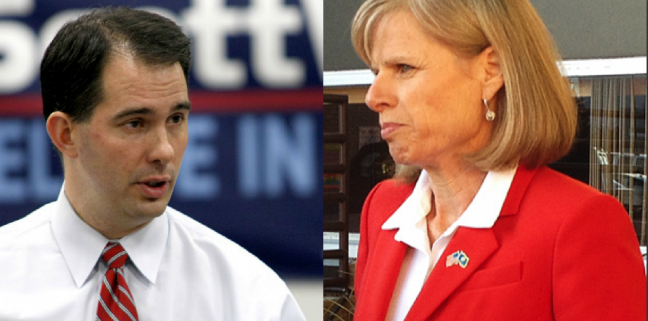With the most recent Marquette Law School poll showing the gubernatorial race in a dead heat, the two candidates’ views toward higher education will likely influence student voters.
Both Gov. Scott Walker and Democrat Mary Burke, the former Trek Bicycle executive, have made curbing student debt a priority, each taking a slightly different focus.
Over the past two years, Walker has focused on keeping tuition costs low and has frozen tuition, which he plans to renew if re-elected. Walker spokesperson Alleigh Marré said Walker has also helped make college more affordable by indexing tuition tax deductions to help more Wisconsinites.
“In Wisconsin, we’re not just talking about making higher education more affordable, we’re doing it,” Marré said in an e-mail. “Gov. Walker enacted the first back-to-back tuition freeze in the history of the University of Wisconsin System, indexed the tuition tax deduction so more families can benefit, and increased higher education aids to the highest level in state history so more students regardless of income can earn a degree.”
In comparison, Burke’s approach has focused more on increasing financial aid to students. According to her jobs plan, Burke would make tuition more tax deductible to help middle class families.
In Burke’s “Invest for Success” plan would allow students to refinance their loans similar to mortgage refinancing as long as they remain in Wisconsin after graduation, according to a statement.
“In her plan, Burke calls for a first-of-its-kind authority allowing re-financing of student loans without using state tax dollars to refinance the loans,” Burke spokesperson Stephanie Wilson said in a statement. “This would help qualifying current borrowers refinance their student loans — just like homeowners can refinance their mortgages — so long as they stay in Wisconsin.”
Both Walker’s and Burke’s methods for lowering higher education costs will benefit students, said Nicholas Hillman, a University of Wisconsin assistant professor in educational leadership and policy.
He said while financial aid targets students with greater financial need, freezing tuition standardizes payment so those who can afford higher costs still pay less. Financial aid has also been shown to increase the probability of a student’s enrollment in a particular school, he said.
“Keeping tuition low will help students, but targeting to them directly will help them even more,” Hillman said.
Charlie Hoffman, the UW College Republicans president, called Burke’s “Invest for Success” plan impractical and costly. Hoffman said he was skeptical the plan would be feasible, saying there is nothing for banks to leverage to enforce the plan.
“She’d like to make student loans like a mortgage or car payment, [but] when you take out a mortgage you have your house to leverage, with a student loan you don’t really have that,” Hoffmann said. “The bank can’t take away your education.”
Both candidates, however, share similarities in some aspects of higher education policy. Both agree on making it easier for students to transfer credits among colleges within Wisconsin and on providing incentives for students to attend technical colleges after high school.
Burke and Walker will face off in the Nov. 4 general election.


